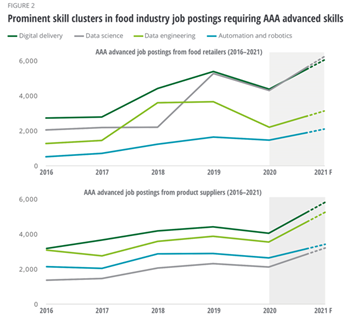By: Doug Baker, Vice President, Industry Relations, FMI
 In the age of social media, smart phones, Wi-Fi, self-checkout lanes and all manner of AI software, it’s no surprise that technology is becoming an ever more critical fixture of food retail operations. Food retailers far and wide are beginning to implement new digital methods of doing business. Exacerbated by the COVID-19 pandemic and consumers’ overnight shift to ecommerce platforms, this adoption of digital infrastructure was not a slow, experimental switch, but a rapid and necessary one. With mask and social distancing mandates in place across the country, food retailers acted swiftly to develop a safe, tech-supported in-store experience for shoppers and employees alike, as well as optimizing their website, app and email outreach efforts.
In the age of social media, smart phones, Wi-Fi, self-checkout lanes and all manner of AI software, it’s no surprise that technology is becoming an ever more critical fixture of food retail operations. Food retailers far and wide are beginning to implement new digital methods of doing business. Exacerbated by the COVID-19 pandemic and consumers’ overnight shift to ecommerce platforms, this adoption of digital infrastructure was not a slow, experimental switch, but a rapid and necessary one. With mask and social distancing mandates in place across the country, food retailers acted swiftly to develop a safe, tech-supported in-store experience for shoppers and employees alike, as well as optimizing their website, app and email outreach efforts.
As a result, the demand for digital skills in the food industry has risen significantly. According to the Future of work: Digital skills in the food industry report by Deloitte and FMI, “Out of the 12 skill types assessed, “digital skills” were indicated to be the ones most likely to increase in value over the next three years, even for the non-managerial, frontline workforce. This was true for product suppliers (95%) and food retailers (92%) alike.” This finding, acquired from surveys of the top 50 food retailers and product suppliers (by US revenue), begs the all-important question: Which digital skills, specifically?
The report found that the most highly sought-after digital skills can be categorized into three principal areas: analytics, automation, and artificial intelligence skills — or the “AAA skill set.” An analysis of food retailer job postings revealed that many new postings for traditionally manual jobs are requiring at least some form of AAA skill. “For example, the analysis… revealed that one in four job postings for cashiers as well as retail store associates, plus three in four job postings for sales representatives, required digital skills.” In fact, the demand for digital skills among cashiers was five-times higher in 2020 than it was in 2017.
This clear trend toward digitization of the food retail workplace can make the prospect of overhauling traditional workflows more enticing, but before such a transition should take place, food retailers should first take stock of the assets they already employ and answer the following questions:
-
Are we taking the time to think through the actual new work to be done and rearchitect it in ways that will allow our people and technology to work together and perform at their best?
-
When redesigning work, are we putting the employee at the center and complimenting their experience through these new and more interesting technologies and skills they get to use?
-
Will our approach to diversity, equity, and inclusion, our social stands, and our contributions to sustainability make it easier to win over digital talent?
-
Does our company culture embrace technology or are we traditionally hesitant?
If the answer to these questions is a confident yes, then food retailers are welcome to venture boldly into the future of work, opening the door to many new and exciting industry innovations as they go.
Click here to see the full Future of work: Digital skills in the food industry report.


 Industry Topics address your specific area of expertise with resources, reports, events and more.
Industry Topics address your specific area of expertise with resources, reports, events and more.
 Our Research covers consumer behavior and retail operation benchmarks so you can make informed business decisions.
Our Research covers consumer behavior and retail operation benchmarks so you can make informed business decisions.
 Events and Education including online and in-person help you advance your food retail career.
Events and Education including online and in-person help you advance your food retail career.
 Food Safety training, resources and guidance that help you create a company food safety culture.
Food Safety training, resources and guidance that help you create a company food safety culture.
 Government Affairs work — federal and state — on the latest food industry policy, regulatory and legislative issues.
Government Affairs work — federal and state — on the latest food industry policy, regulatory and legislative issues.
 Get Involved. From industry awards to newsletters and committees, these resources help you take advantage of your membership.
Get Involved. From industry awards to newsletters and committees, these resources help you take advantage of your membership.
 Best practices, guidance documents, infographics, signage and more for the food industry on the COVID-19 pandemic.
Best practices, guidance documents, infographics, signage and more for the food industry on the COVID-19 pandemic.
